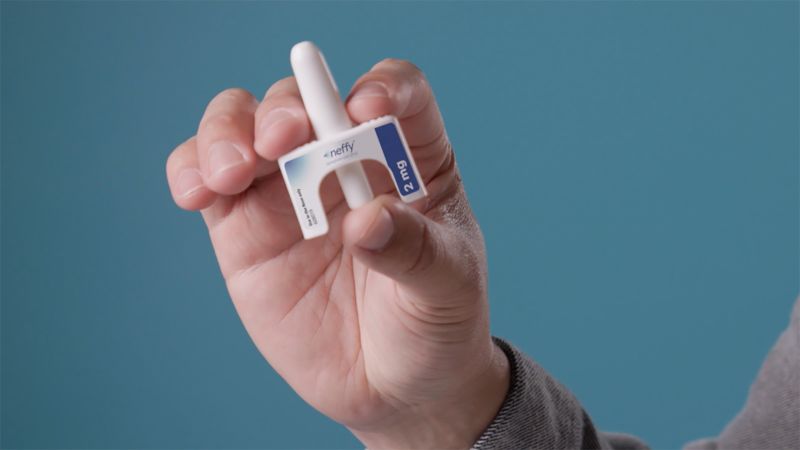The US Food and Drug Administration approved the first nasal spray epinephrine drug for severe allergic reactions known as anaphylaxis, providing a needle-free alternative to EpiPens and similar medicines.
The drug, called Neffy, is cleared for adults and children who weigh more than 66 pounds, the agency said Friday. It’s given as a single dose sprayed into one nostril. A second dose may be given if needed, similar to injectable epinephrine, the agency said.
Neffy uses the same spray device as Narcan, the naloxone nasal spray for opioid overdose, according to a spokesperson for its maker, ARS Pharmaceuticals.
“Anaphylaxis is life-threatening and some people, particularly children, may delay or avoid treatment due to fear of injections,” said Dr. Kelly Stone, associate director of the Division of Pulmonology, Allergy and Critical Care in the FDA’s Center for Drug Evaluation and Research, said in a news release. “The availability of epinephrine nasal spray may reduce barriers to rapid treatment of anaphylaxis.”
The approval was based on studies in 175 healthy adults measuring concentrations of epinephrine in the blood, which showed comparable levels for Neffy and injected epinephrine, as well as similar increases in blood pressure and heart rate. A study in children weighing more than 66 pounds found comparable epinephrine levels to those in adults.
The drug had been expected to be approved last year, but that was delayed as the FDA sought more information about repeat dosing. The agency said Friday that patients may need to seek emergency medical assistance for close monitoring after experiencing anaphylaxis, and in case further treatment is needed. It’s also recommended that patients who get injectable epinephrine seek immediate emergency care.
The FDA noted that people who have nasal conditions like polyps or who have had nasal surgery may not absorb Neffy sufficiently and should talk with a health-care provider about whether an injectable epinephrine would be better for them.
The most common side effects of Neffy include throat irritation, tingling nose, headache, nasal discomfort and feeling jittery, the FDA says.
Anaphylaxis is most often caused by reactions to medication, foods or insect stings, according to the American Academy of Allergy, Asthma and Immunology. Symptoms, which typically start within five to 30 minutes of contact with an allergen, include hives, swelling of the throat and other areas, wheezing and passing out.
“Anyone who has experienced or witnessed an anaphylaxis reaction knows it can be very stressful deciding when to inject epinephrine to themselves or a child and often delay,” Dr. Jonathan Spergel, chief of the allergy program at Children’s Hospital of Philadelphia, said in a news release from ARS Pharmaceuticals. “We know that earlier administration is better, and for many, the needle is a barrier that causes dangerous hesitation. That is why the field has long pursued an effective treatment approach that does not require an injection.”
ARS Pharmaceuticals didn’t disclose the list price of Neffy – how much it costs before insurance or other discounts – in its news release Friday.
ARS Pharmaceuticals said that for people with commercial insurance that covers the drug, the price out of pocket would be no more than $25 for two single-use devices, via a co-pay program. For certain people who don’t have insurance coverage or who face high out-of-pocket costs, the company said, the price would be $199 for two doses of Neffy. For other those who can’t afford the medicine, the company said it would provide it for free.
The medicine is expected to be available in the United States within eight weeks, ARS said. Lowenthal said it had manufactured several lots in anticipation of approval and is in the process of scaling up to be able to meet anticipated demand.
He said the company’s market research suggests that there are 3.2 million people “that really hate those autoinjectors, children that are terrified of needles,” who are going to “switch very quickly” to the nasal spray and that an additional 3.3 million people have had prescriptions written for injectable epinephrine but who haven’t filled them and may switch, as well.
ARS also believes that another 13.5 million people have been diagnosed with anaphylaxis who have never received a prescription, Lowenthal said, “and now there’s a safer, easier-to-use alternative – needle-free, pain-free – they’ll be able to also protect themselves.”
Ultimately, Lowenthal expects an uptake of Neffy similar to nasal-spray naloxone, or Narcan, which he said accounts for 80% of use of the opioid-overdose reversal drug. He said his team has talked with companies that make emergency kits for airplanes, and the medicine could also be stocked in public places like restaurants.
The FDA, Lowenthal noted, asked ARS to run studies of the drug using “passerbys,” “somebody we pull off the street who has no idea about this product, no idea about the disease.”
Those participants were put in a simulated experiment as if they were in a restaurant with another patron experiencing a severe allergic reaction, and they had to read the instructions and administer the drug, Lowenthal said.
- Sign up here to get The Results Are In with Dr. Sanjay Gupta every Tuesday from the CNN Health team.
“One hundred percent of them did it right without any instructions, training, nothing,” he said.
The company also plans to file for FDA approval of Neffy for children who weigh between 15 and 30 kilograms (33 and 66 pounds) by the end of the third quarter of this year, or before October. Lowenthal said that would be a lower dose, similar to how EpiPen comes in a lower dose for smaller children.
“The allergy community has been waiting for this and happy to see the FDA approved it,” said Dr. Purvi Parikh, an immunologist and allergist in New York who isn’t affiliated with ARS Pharmaceuticals.
“It’s super important because there are a lot of needle-phobic patients who won’t use their EpiPens in critical situations,” including children and their caregivers, she said.
“Similar to Narcan,” she added, “this will save lives.”

